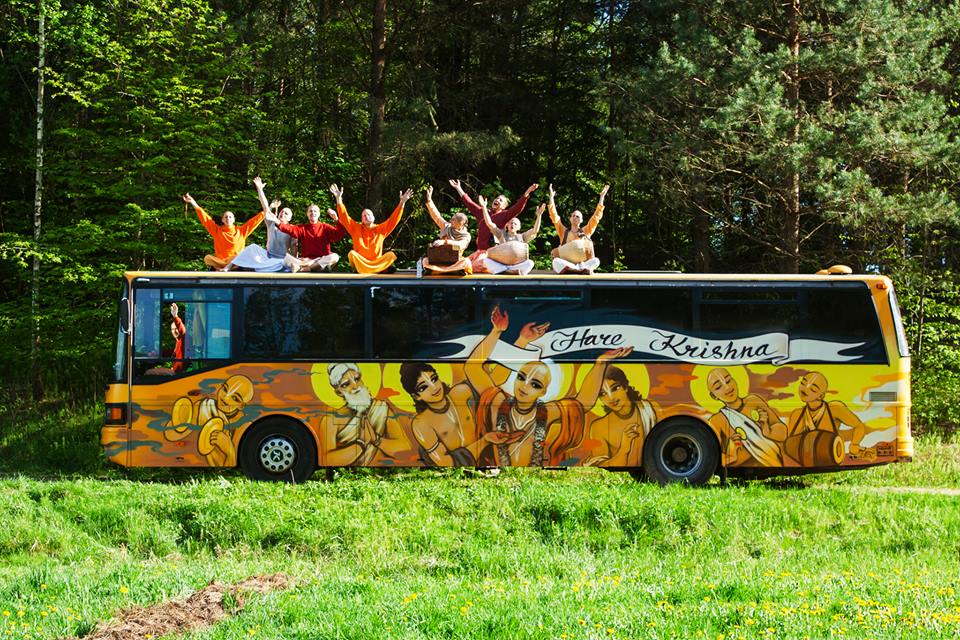
“Hare Krishna, Hare Krishna, Krishna Krishna, Hare Hare, Hare Rama, Hare Rama, Rama Rama, Hare Hare” – represents the maha mantra that the members of the Krishna Consciousness Society in BiH sing, both individually and collectively, in the city streets, which is why people colloquially call it Hare Krishna.
Hare and Krishna are two of the religion’s three names for God (Hare, Krishna, and Rama). When translated from Sanskrit, Krishna means “The one who is all-attractive” and, also, “The one who stops the continuous cycle of birth and death”. Hare is the vocative case of Har and represents the name of the Krishna inner energy of satisfaction. When translated from Sanskrit, the Maha Mantra means: “O God, o energy of God, please engage me in Your service.”
“We sing this maha-mantra to develop a relationship with God, to turn the focus of our lives away from ourselves and to develop our selflessness, dedication, and love towards God. This is recommended in the oldest writings of this world, which are called Vedas in Sanskrit. The writings explain that the cause of man’s suffering in this world is the attitude of “me and mine”, because, in fact, nothing truly belongs to us. Everything is created by God and we only use it temporarily while we are in this world,” a representative of the Krishna Consciousness Society in BiH explains.
Awareness of this is called the Krishna consciousness. Each day begins with a maha-mantra so one can remain aware during the day that everything we use is not ours, but that it belongs to Krishna. We should not tie ourselves to what we will have to leave behind after our lives in this world. In this way, we purify our heart from internal enemies that result from the excessive attachment to material goods – envy, lust, greed, anger, illusion, and madness,” the representative explains.
In the former Yugoslavia, the movement has been present since the 1970s and has existed in BiH since 1988. It was officially registered as a religious community in BiH in 2005 and has around 500 followers. There is an organized community in Sarajevo and there are also members in other BiH cities.
Some Teachings of the Krishna Consciousness Society
The basic teaching of Krishna consciousness is that we are not this body, but a spiritual soul.
“The soul lives in the body and perceives this world around it with material sensations, however, the sensations experienced through the body are not the happiness that most people believe it to be,” the society member said during an interview with Balkan Diskurs.
Members of this religious community believe that happiness can’t be experienced through physical things or consumerism of any kind, but that happiness is a spiritual feeling experienced only through spiritual activities.
“Bhagavad-gita, the central book of this spiritual science, recommends that singing Krishna’s names is a process for experiencing the spiritual happiness that humanity must follow. As soon as the soul experiences such happiness, it achieves a much-desired inner peace and satisfaction and there is no longer any need for excessive fulfillment of bodily requests to eat, sleep, reproduce, and defend more than is necessary to sustain the soul and body together in life while we are here in this material world,” the Krishna Consciousness Society representative says.
Our interlocutor also explains that the spiritual soul is all living things – humans and animals and birds and insects and plants. A spiritually self-aware person, thus, looks at all through equal eyes. It does not regard itself as a master and a person who enjoys the material nature, but rather respects her as a God’s creation and does not exploit her. It takes what it needs to survive from nature. It protects her, it leads a peaceful life as a vegetarian, knowing that animals are our four-legged brothers and sisters.
Gatherings in squares, parades, and singing of the maha-mantra on the streets are one of the ways that members of this group try to spread their teachings. They explain that the interests of people are different; whereas some are interested and want to know more, others are completely spiritually deaf. Anyone who becomes interested in this spiritual science joins voluntarily. There is no imposition, the religion’s followers respect everyone’s free will, and that’s the reason they don’t encounter any unpleasant or awkward situations.
“We give free lectures on spiritual science in our centers. We recommend that mankind read about it in the books of His Divine Grace A.C. Bhaktivedanta Swami Prabhupada, which are translated into more than 50 international languages,” the religious representative explains.
For members of the Krishna Consciousness Society in BiH, all these activities play a special role – the systematic promotion of spiritual knowledge in society.
“We try to educate people about the techniques of a spiritual life as a means to establish a balance of living values and achieve true unity and peace in the world. Therefore, completely free and as volunteers, we offer this spiritual knowledge to all people regardless of religion, race, nationality, sex, and economic or social status – because everyone needs peace,” the representative concludes.
This article is part of the “Religious Minorities in Bosnia and Herzegovina” series, which presents information about various religious groups and communities in BIH that aren’t recognized as traditional religious communities but have a significant number of followers.
Read Part I, “Meet the Mormons”, here.
The Balkan Diskurs Youth Correspondent Program is made possible by funding from the Robert Bosch Stiftung and the National Endowment for Democracy (NED)







